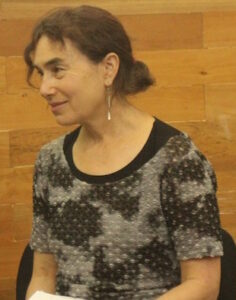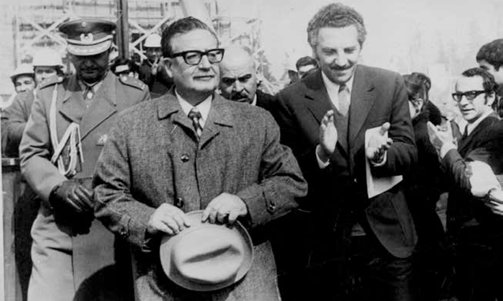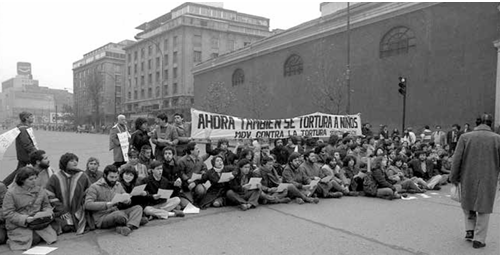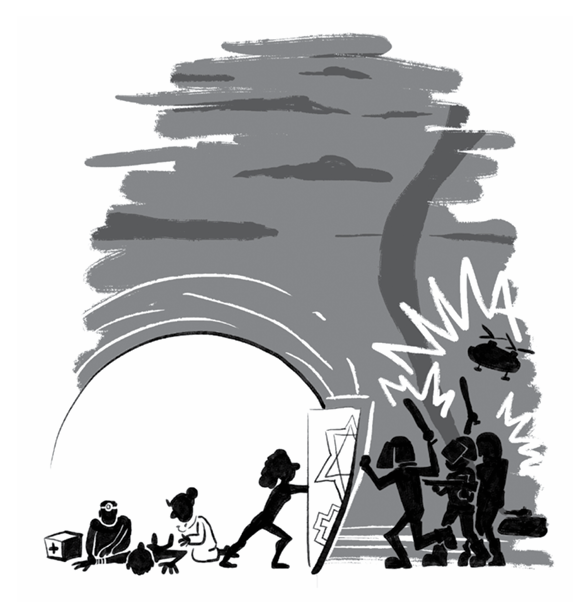The following is an excerpt from “Fragments III: Democracy, “ a journal from T’ruah.
The Chilean election of Salvador Allende was a landmark moment in a long history of U.S. intervention in Latin America. Allende was a socialist who sought to redirect profits from industries such as copper, where U.S. companies were heavily invested, toward public use for Chileans. When U.S. private and public efforts to tar Allende’s reputation and fund his opponents failed, President Richard Nixon and the CIA resorted to covert action, blockades, and violence to make governance by Allende untenable.[1] Increasing chaos in the country culminated in a 1973 coup, leading to seventeen years of dictatorship and violent repression of dissent. This essay contains some mentions of that violence. Author and journalist Maxine Lowy tells the story of how Chilean Jews negotiated the years of dictatorship, and how Chileans arose to build resilient communities of support and resistance until democracy could be restored.
Certain times and certain places test our moral integrity. During the 1970s and 1980s, the Jewish community of Chile faced such a dilemma.
It all began on September 4, 1970, as Salvador Allende greeted jubilant crowds in Chile’s capital city after his electoral triumph. The election was a happy surprise to many and shocked others, internationally and at home. It was the first time in world history that a socialist had been elected president by democratic means.
Amid the throng in Santiago, cheering Allende’s speech, was 25-year-old Claudia Chaimovich. For Chaimovich, then a law student, it was “one of the happiest moments of my life.”[2] In the frequent marches that were organized over the next three years to show support for Unidad Popular (UP), Allende’s Popular Unity government, “I walked through the streets feeling those streets were mine, brimming over in happiness,” remembers Chaimovich. “I believed that change was in reach and happiness had arrived for all. Everyone would be able to study, have a house of their own, and enjoy life with their families. The air we breathed felt different.”
Not all Jews in Chile agreed. Like Chilean society as a whole, Chile’s Jewish community was polarized. Despite his personal reassurances to Jewish community leaders, many Jews feared that Allende’s rule would resemble Stalinism or even Nazism — not his moderate, reform-oriented brand of socialism. Claudia’s older sister was ready to pack her bags and join the stream of Jews leaving the country. Neither the half-liter of milk that boosted child nutrition, nor the new, government-supported Quimantú publishing house designed to make literature accessible to all, nor any other new reform impressed her. She feared that the UP government would expropriate her husband’s Wrangler jeans factory and that life would become unbearable.
A majority of Chileans across all party lines had reached a consensus on their country’s right to control and benefit from its natural resources. Indeed, such reforms had been underway since 1967, under a Christian Democratic president. Now, following unanimous approval by Chile’s Congress in 1971, Allende’s administration nationalized a number of large industries, including the American copper mine giants Anaconda and Kennicott.
For Allende’s opponents within and outside of Chile, the move to nationalize copper raised the stakes. The United States had already taken action to destabilize the new government, most notably a month after Allende’s election, when the CIA backed the assassination of Chile’s army commander-in-chief.[3] Now the United States stepped up covert efforts to undo the UP government.
Claudia Chaimovich and her sister had been raised by Jewish immigrant parents who imbued their children with a deep awareness of their Jewish identity. Shockwaves from the long nightmare called the Shoah had not receded when she was born in 1947 and were ever-present throughout her childhood, as her parents mourned relatives who had perished. Although she rarely entered a synagogue, Claudia associated her family’s values of democracy, freedom, ethics, and justice with being Jewish.
These values and history led many Jews to populate the Chilean left. Young Jews who had spent formative years in the Hashomer Hatzair scout movement, where Allende had made a campaign stop, enthusiastically volunteered to help his campaign. Upon his election, Allende appointed more Jews to various positions in his administration than any previous or future Chilean government. Claudia’s aunt, Dora Guralnik, a Communist Party member and a dentist, was chosen to direct the government’s Basic Health Groups program, sending teams of young professionals to industrial districts to attend to workers’ dental problems.
Midway through what should have been Allende’s six years in office, Chile’s democracy and human dignity plunged into the depths of an abyss, where it remained for nearly two decades. Chilean Jews found themselves at a moral crossroads.
Golpe — Coup
Nothing prepared Chileans for the ferocity and scope of the military coup (golpe in Spanish) on September 11, 1973, that unleashed almost two decades of dictatorship. At noon, standing a mile away on an arched bridge over the Mapocho River, Claudia watched in horror as jets bombed the La Moneda presidential building a mile away. It was as if the U.S. Air Force were bombing the White House. “Panic overtook me,” she says.
The changes were immediate. By the end of that first day of dictatorship, President Allende was dead, Congress was shut down, and cabinet ministers, governors, congressmen, and most public employees were arrested. Political parties and unions were banned, and indiscriminate massive arrests and raids of homes in working-class areas, universities, and workplaces were taking place throughout the length of Chile. Over the next 17 years, more than 2,000 people would be summarily executed, 1,090 forcibly disappeared, 40,000 tortured, and 200,000 forced into exile, while thousands more were dismissed from their workplaces and expelled from universities.
In the northern desert town of Calama, Dora Guralnik’s son, Carlos Berger, worked as a communications director for the nationalized Chuquicamata copper mine. He and dozens of others were detained. At a rushed hearing, a war council sentenced him to 60 days in prison. But on the afternoon of October 19, Carlos and another 25 detainees were removed from the jail and taken to an unknown location. Soon afterward, the family learned that Carlos and the entire group had been shot. Claudia’s soul was pierced, watching her aunt and mother shrieking and doubling over upon learning the news. Decades later it came to light that the group of prisoners had been taken to the outskirts of the city and slaughtered, their bodies concealed in unmarked graves.
Five months later, a military patrol came for Claudia when she happened to be out. After taking refuge in a convent, she fled the country for safety, staying away for six years. It was astounding to Claudia that her work as a legal assistant for the UP and her limited political participation merited imprisonment and had forced her to flee.
A heavy atmosphere of repression developed: arbitrary detentions, collective punishment for anyone sheltering a persecuted person, disproportionate retribution for infringement of senseless decrees, which ranged from forced haircuts for young men who wore their hair long to the prohibition of any kind of meeting without permission. “It felt like we were reliving Nazism,” Claudia recalls. “In Europe, mainly Jews were persecuted, but here, anyone could be targeted.”
Pikuach Nefesh — Saving Lives
Chile’s Catholic Archbishop, Raul Silva Henriquez, had been known as a politically conservative priest. He had not been among the liberation theology adherents who wholeheartedly supported Allende. But the horrors he witnessed in the initial days and weeks after the coup propelled him to save lives. The archbishop gathered interfaith leaders who had been trying to foster channels of dialogue in the months leading up to the coup, including Rabbi Angel Kreiman, to create the Pro Paz (Pro-Peace) Committee. Thus emerged an extraordinary movement, unlike any other in Latin America under authoritarian rule. The Pro Paz Committee, succeeded three years later by the Vicaría de la Solidaridad (Vicariate[4] of Solidarity), was the first of several human rights protection agencies that functioned openly while the dictatorship raged around them. Unlike Argentina’s dictatorship during the same years, which counted on the support of the Catholic Church, Archbishop Silva’s leadership mandated a first line of defense and resistance.
Like rescuers of Jews under Nazi occupation, courageous political and religious networks and individuals now put themselves on the line to protect persecuted people. With the help of international funding, new organizations emerged that openly assisted people with all manner of pressing needs. Doctors treated the wounded; social workers, psychologists, lawyers, and journalists used their professional knowledge to protect lives and support family members of the detained. They also informed the world of the regime’s widespread human rights violations. At the Vicariate, staff worked long hours, including on weekends, passionately sure of the need to continue.
The psychologist Elizabeth Lira, recipient of Chile’s 2017 National Humanities and Social Sciences Award, has said, “Not everyone who worked at these human rights protection offices identified with the political ideas of some of the persecuted, but they could not allow people to be persecuted for those ideas. What occurred was a moral discernment that professionals channeled into an immense passion for the services they provided. Motivated by the notion of a shared humanity, they did everything in their power to protect people.”[5]
Jewish staff could be found in nearly every institution that arose to protect lives. When she returned to Chile in 1979, Claudia joined the Vicariate legal department. Lorelei Friedmann and Washington Domb, both Jewish, were also staff attorneys. Since the initial weeks after the coup, lawyers had been filing habeas corpus writs, crucial to protect prisoners’ lives. Few succeeded; between 1973 and 1987, the courts, complicit with the state’s repressive practices, denied 5,000 writs and accepted only 10. Undaunted, Vicariate legal director Roberto Garreton instructed staff to keep filing habeas petitions. Maybe the next one will be accepted, he told them. “He never stopped believing that justice was possible. That made me believe, too,” says Claudia. Fifteen years later, with democracy restored, that optimistic foresight paid off, as lawyers pursued and won cases for crimes against humanity based on those initial habeas corpus writs and documentation gathered under conditions of dictatorship.
Staff at the Vicariate and other human rights agencies were harassed, arrested, and even murdered. But Garreton’s capacity to transmit optimism, coupled with the emotional support that infused the Vicariate, gave Claudia and other staff strength to endure what was at times a dangerous job. “I was a very fearful person, but as soon as I opened the door to enter the Vicariate, I felt immensely protected and cared for. It was like entering a Jewish temple, where love and tranquility enveloped you. Doing what I knew had to be done gave me a sense of peace. I don’t remember any other place where I felt so at ease.” Working at the Vicariate was particularly meaningful to her as a Jew. “At the Vicariate, it was a plus to be Jewish. You were viewed as a member of a persecuted people, someone presumed to be sensitive to oppression. Being a Jew in this country can be challenging. It was the only time in my life that I felt such pride in being Jewish in Chile.”
Kehilah — Community
The coup brought not only repression but also economic challenges. The new regime implemented neoliberal economic policies, including deregulation and privatization of basic services. Within three years of the coup, 57 percent of Chilean households were submerged in poverty. With the visible support of a leader of Chile’s Catholic majority, grassroots resistance to the dictatorship arose in Christian spaces. To counter the barren social setting imposed by the military, Catholics and Protestants formed Christian base communities (CBCs). Chavurah-like groups with varying degrees of autonomy from nearby churches in mainly working class neighborhoods, the CBCs proliferated as oases of social participation, democratic practice, and emotional support. During the height of the dictatorship, the CBCs offered creative resistance to police repression, as well as to the economic policies that bore down on many families.
The CBCs formed buying co-ops, community kitchens, craft workshops, and other ways to help people survive. Guided by volunteer medical students, neighbors also learned emergency first aid to treat wounded people, in chapels that were transformed into triage wards.
CBCs built a collective culture of inspiration for the risks they were taking. Once a week, they met in each other’s homes to study biblical texts and analyze how to put these values into practice. Prophets Amos, Isaiah, and Jeremiah inspired them to action. “How can I not speak out, with Your voice burning inside me,” they heard Jeremiah tell them. [6]
At a time when it was unsafe to participate in overtly political activities, the base communities drew in people who had been political activists before the coup, and forged spiritually minded people into social activists. The encounter between the two currents transformed participants personally and created a new, vibrant force.[7] Institutions of resistance, like the CBCs and the Vicariate, gave people grounding in hope for their struggle and made clear the crucial role of community in times of despair.
Dina d’malkhuta dina — The Law of the Land Is Law
When Claudia was in danger of being arrested — or worse — her father, a respected pharmacist, turned to friends in the Jewish community’s leadership for help. A lawyer friend, who had become a prosecutor for the military regime, remarked, “That’s what she gets for mixing with those communists.” Another influential Jewish leader asked why Claudia was with a boyfriend who was not Jewish. A third pointed out that he had never seen Claudia at the Estadio Maccabi, Santiago’s Jewish cultural and recreational center.
While many individual Jews actively engaged in resisting the dictatorship and protecting persecuted people, Jewish communal institutions had taken a different turn. International interfaith efforts were mobilizing support to protect people and create human rights advocacy organizations,[8] yet the Jewish communal response to systematic human rights violations appeared to reflect considerations other than pikuach nefesh.[8]
Jewish institutions took pains to show their compliance with the new regime. Three weeks after the coup, the Jewish community newspaper featured a congratulatory front-page photo of newly-installed dictator Augusto Pinochet. Just as it had when Allende was elected by democratic vote, the newspaper extended its “greetings to the Honorable Government Junta” and “Mr. President,” who had come to power through a brutal military overthrow. When the dictator’s wife launched a fund for “national reconstruction,” the committee of Jewish institutional representatives urged Jews to contribute money and valuables. Beginning one year after the coup, and each year thereafter, a member of the military junta would attend noontime Yom Kippur services to hear Jews recite a prayer for the nation.
From the dictatorship’s earliest days and throughout its long duration, Chilean Jewish institutions that before the coup had affirmed neutrality in national political affairs, including the governing committee, expressed support for the dictator and the regime he headed. In allaying insecurity for part of the Jewish community, Jewish institutions put other Jews at risk, turning the ancient rabbinic principle of dina d’malkhuta dina into a dangerous, unquestioning form of abiding by the law of the land.
Outside of Chile, Rabbi Morton Rosenthal of the Anti-Defamation League and French Grand Rabbi Jacob Kaplan lent important support to individual cases. Inside the country, Jewish institutions authorized one rabbi, Angel Kreiman, to maintain good relations with the Catholic Church by taking part in the Pro Paz Committee. But when Kreiman’s participation compromised the Jewish community’s good relations with the military junta, communal leaders reined him in, dictating whom he could fight to save and whom to leave to the mercy of repressive agents.
In the days immediately after the coup, Israeli Ambassador Moshe Tov went against this trend. Ignoring criticism from Jewish leaders, he followed the example of most other diplomatic missions and sheltered dozens of dissidents on embassy premises. Yet Israel ultimately chose to reinforce the dictatorship.[9] Several years later, when the U.S. had cut off military aid to Chile, Israel became Chile’s main military supplier and ally at the United Nations.[10] In 14 separate General Assembly resolutions condemning Chile’s disregard for human rights, Israel voted no or abstained.
Teshuvah — Returning to Life
In March 1990, a democratically elected president was sworn in for the first time in the 20 years since Allende’s election. One of his first acts in office was the creation of a National Truth and Reconciliation Commission to document human rights violations by the dictatorship. Within a few years, many institutions that had fought the dictatorship were brought to a close. A new Catholic archbishop dissolved the CBC coordinating board, a sign that the social gospel and lay participation were no longer a priority for Chile’s Catholic Church. The Archdiocese closed the Vicariate of Solidarity, deeming it no longer essential in the f ledgling democracy.
As the formal institutions of democracy return, Chileans have directed their attention to the work of democracy that remains undone. The constitution installed in 1980 by the military dictatorship remains in place, with profound societal inequities built into it. In October 2019, a pot that had been simmering for four decades boiled over, as a mass social movement swept across Chile, exposing four decades of economic injustice, a consequence of the persistent legacy of dictatorship.
The brutal police and military response in 2019 suggested that many in government had not fully learned lessons from the past. Yet activists have learned from the experience of dictatorship. CBC members learned to exercise their rights and, wherever they have gone, they never remain indifferent to injustice. The revived Sebastian Acevedo Movement Against Torture has resumed non-violent acts of conscience. Today, among other things, it denounces injustices against the Mapuche indigenous nation of southern Chile.
The Jewish community continues to grapple with the legacy of the dictatorship. In 2013, a memorial to 17 Jews executed or forcibly disappeared by the military regime was installed in a Jewish cemetery in Santiago. Family members of the victims welcomed the memorial as a gesture of recognition of their pain, stemming not only from the loss of their loved ones but from the ostracism they felt from Jewish institutions. At the same time, they urged Jewish leaders to continue along that path towards teshuvah, to enable moral reparation with Jewish victims and Chilean society as a whole. Jewish institutions, the families suggest, can join one of many ongoing lawsuits for crimes against humanity on behalf of victims of the dictatorship, and individuals can testify as witnesses in different cases. Synagogues and Hebrew schools can break the silence by holding tributes to remember Jewish victims and incorporating human rights as part of curricula and bar/bat mitzvah preparation.
Of the Vicariate of Solidarity, where Claudia Chaimovich once fought for others and found a place of refuge for herself, one department still operates: its Archive and Documentation Center. There, historians, students, and lawyers consult records of the country’s tragic history so they can spread knowledge. Legal cases related to human rights violations have been transferred to pro bono attorneys, many of whom were former staff lawyers.
Since 1990, Claudia has focused on a broader scope of human rights violations, including serving as a judge for the Santiago Court of Appeals, seeking reparations for crimes against human rights during the dictatorship, and specializing in legal advocacy on issues of domestic violence.
She urges Jewish communities of the United States who are concerned today about rising authoritarianism not to wait. “Now is the time to reinforce networks that can brace the most vulnerable segments of the population. Create communities that imbue participants with a passionate commitment and sense of connectedness, where there is a place for everyone. And never forget that democracy, solidarity, and freedom are Jewish values.”
NOTES
1 On U.S. disruption of Chilean democracy, see “The U.S. set the stage for a coup in Chile. It had unintended consequences at home,” James Doubek, (September 10, 2023) https://www.npr.org/2023/09/10/1193755188/chile-coup-50-years-pinochet-kissinger-human-rights-allende.
2 Interview with Claudia Chaimovich (March 25, 2024).
3 Army Commander-in-Chief René Schneider was abducted and assassinated on October 25, 1970, in a plot conceived by the U.S. CIA because the general, who had pledged to uphold democracy, was an obstacle to a U.S. coup attempt. https://nsarchive.gwu.edu/briefing-book/chile/2020-10-22/cia-chile-anatomy-assassination
4 A vicariate is a Catholic unit headed by a vicar, similar to an archdiocese office.
5 Elizabeth Lira, December 7, 2017, during the launch event for this author’s book, “Memoria latente: una comunidad enfrentada por el desafío de los derechos humanos en Chile” (published in English as “Latent Memory: Human Rights and Jewish Identity in Chile”).
6 Jeremiah 20:9
7 For example, in 1983 some CBC members founded the faith-based nonviolent Sebastian Acevedo Movement Against Torture, which held sit-ins and unfurled banners outside places where secret police were known to subject detainees to torture.
8 The World Council of Churches funded a Protestant organization, FASIC (Foundation for Christian Church Social Assistance), to help Chilean former prisoners and their families find safe haven in other countries. With the support of a Finn and Swedish interfaith association, PIDEE (Program for the Protection of Children Harmed by States of Emergency) was created to provide psycho-social support for children whose parents were victims of repression. The Lutheran Church of America funded a new organization, EPES (Educación Popular En Salud), to cultivate community health promoters in shantytowns and empower women. The Swedish humanitarian assistance organization Diakonia also provided crucial support to various groups.
9 On Tov’s role, see “A Tzaddik Among the Nations He Isn’t: Pinochet Knew Why He Loved the Israeli Ambassador.” Eitay Mack, (Haaretz, June 30, 2022) https://www.haaretz. co.il/opinions/2022-06-30/ty-article-opinion/.premium/00000181-b3bb-da42-abdd-b7bf305b0000
10 In December 1974, the U.S. Senate voted to cut off military aid to Chile. Known as the Kennedy Amendment due to the driving force of Senator Edward Kennedy, it was the first time in U.S. history that military aid was conditioned on a country’s respect for fundamental rights.

MAXINE LOWY (she/her) is a freelance journalist, editor, and translator based in Santiago, Chile. Her work focuses on human rights, historic memory, and contemporary social issues, mainly in Chile. She is the author of “Latent Memory: Human Rights and Jewish Identity in Pinochet’s Chile” (University of Wisconsin Press, 2022).



